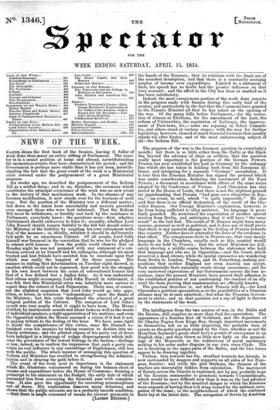NEWS OF THE WEEK.
,
EASTER closes the first book of the Session, leaving it fuller of work chine than many an. entire sitting of Parliament. The coun- try is in a sound, position at home and abroad, notwithstanding the momentous events that have characterized the period ; and the Government is perhaps more stable than it has yet been, notwith- standing the fact that the great event of the week is a Ministerial .crisis covered under the postponement of a great Ministerial measure.
Six weeks ago, we described the postponement of the Reform Bill as a settled thing ; and to us, therefore, the ceremony which constitutes the principal occurrence of the week was no new event in the history of that meritorious work. In the absence of any foreseen modification, it now stands over for the business of next year. But the position of the Ministry was a different matter ; and down to the latest hour uncertainty and anxiety prevailed even amongst those who were best informed. That the Reform Bill must be withdrawn, or forcibly cast back by the resistance in Parliament, everybody knew : the questions were—first, whether Girvernment should endeavour to force it ; secondly, whether Lord John Russell should remain faithful to the bill but should relieve the Ministry of the liability by coupling his own retirement with that of the measure ; or, thirdly, whether it should be deliberately laid'aside by an unanimous Cabinet. Of all people, Lord John himself Was- foremost in the conviction that he was too far pledged to retreat with honour. Even the public could observe that on Monday night he was not prepared with any statement of a con- clusion arrived at by himself and his colleagues, although his most trusted and best friends have assisted him to conclude upon that which was really the happiest of the three courses. His manner in stating that determination on Tuesday night showed, in emotion which could not be repressed, how great was the struggle in his own heart between his sense of conventional honour and that of a less defined but a higher duty. As it was understood that others might accompany Lord john Russell in retirement, it was felt that this Ministerial crisis was infinitely more serious in aspect than the retreat of Lord Palmerston. There was, of course, not the slightest suspicion that Lord John would go into oppo- sition, or haver, in "vivacious "independence," upon the flanks of the Ministry; but this crisis threatened the removal of a great integral portion. of the Cabinet. The reception of Lord John's speech was.very nearly what it ought to have been. The House testified; by inarticulate sounds and silent looks as well as the words of indiVidual speakers, a right appreciation of his motives ; and even the Opposition within the Howie assumed a virtue if it had it not, in paying tributa.to the feeling of the hour. We have some right to doubt the eoutpleteness of this virtue, since Mr. Disraeli as- tonished even his enemies by taking occasion to deviate into un-
timely criticisms; and the printed organs of his party out of doors haie indulged in a haiguage of vulgar disparagement which indi- cates the prevalence of the lowest feelings in the faction,—feelings so lew,_indeed, as to confirm the impression that such a party can retain no real influence in any assemblage of Englishmen, still less with the public. The whole manner of arranging this question of Reform and Ministers has resulted in strengthening the 'Adminis- tration and in clearing the path before it. The event of the week next in importance is the statement which Mr. Gladstone volunteered on laying the balance-sheet of income and expenditure before the House of Commons ; forming a postscript to his statement on the Budget the early date of which prevented him from surveying the financial year with complete- ness. It also gave the opportunity for correcting misconceptions out of doors. His explanation removes many delusions, and shows that the public accounts are in a perfectly smooth condition, —that there is ample command of means for current payments in the hands of the Treasury, that its relations with the Bank are of the soundest description, and that there is a constantly accruing surplus of income over expenditure. Limited to a statement of facts, his speech has no doubt had the greater influence on that very account; and the effect in the City has been as marked as it has been satisfactory.
Indeed, the most conspicuous portion of the work done consists in the progress made with finance during this early half of the session, and particularly in the fact that the Commons have granted to the Finance Minister all that he has asked on the opening of the war. Of the many bills before Parliament,—for the correc- tion of Abuses at Elections, for the amendment of the Law, the reform of Universities, the regulation of Railways, the improve- ment of Poor-laws, &C.,—some are reposing in Select Commit- tee, and others stand at various stages ; with the way for further legislation, however, cleared of much financial business that usually stands till after Easter, and of the most embarrassing subject of all—the Reform Bill.


























